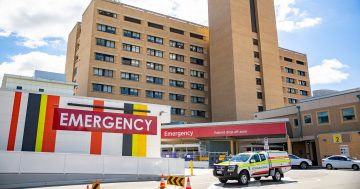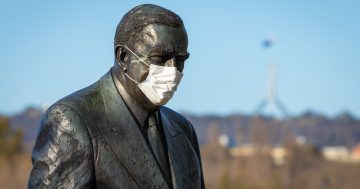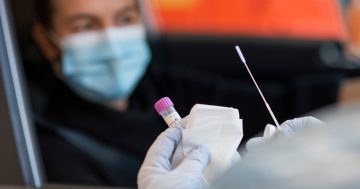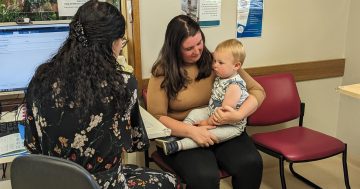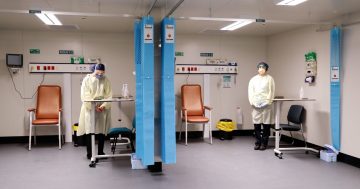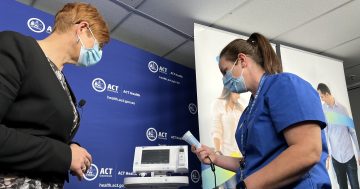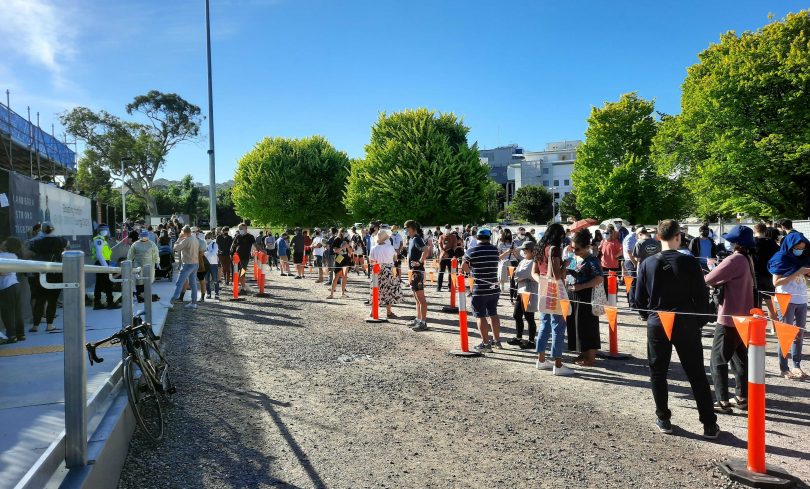
Queues at Garran are over two and a half hours, according to the ACT Government’s COVID-19 website. Photo: Ian Bushnell.
UPDATED 2 pm: In an effort to protect the vulnerable but still allow families to come together for Christmas Day, the ACT will implement stricter visitor restrictions at healthcare facilities and hospitals, but the changes will commence on Boxing Day.
New test, trace, isolate and quarantine (TTIQ) arrangements will also begin today, with a narrower definition of close contacts flagged, as well as an increased focus on personal responsibility for casual contacts.
ACT Minister for Health Rachel Stephen-Smith said she understood this is an important time for families to spend together, but the evolving situation in NSW is of concern.
Therefore, from 12:01 am on Boxing Day, no visitors will be able to enter health facilities unless in “exceptional circumstances” such as end-of-life care, birthing or paediatric care, Ms Stephen-Smith said.
“This is being done in order to protect our vulnerable patients, as well as healthcare workers.”
Exceptions to the no-visitor policy will include admitted babies, children and young people (0-17 years), who may have one parent/carer per day.
Women admitted for care related to birthing may have one person for the duration of their admission.
As foreshadowed yesterday, the ACT will now change its approach to TTIQ arrangements in response to rising case numbers in all jurisdictions.
“We have been signalling this for a long time,” ACT Chief Health Officer Dr Kerryn Coleman said.
Close contacts or positive cases will now receive either a text notification or a phone call from ACT Health to notify them and provide them with instructions to follow.
The definition of a close contact will also shift. Now, someone will only be considered a close contact if they have spent a significant amount of time in close proximity with someone, such as a household contact.
“This brings us into line with how NSW and Victoria are assessing close contacts,” Dr Coleman said.
However, high-impact locations such as indoor bars and nightclubs will still be considered close contact sites.
Casual contacts will no longer need to fill in a declaration form but will still need to get a test on the day they are notified, as well as a second test on day six.
“We are relying on you guys doing the right things moving forward,” Dr Coleman said. She noted there is no longer the workforce capacity to actively follow up every single casual contact given the likelihood these numbers will increase.
Teams will now focus contact tracing efforts on whether people have gone to high-risk venues or come into contact with people who are at serious risk of illness.
As Dr Coleman said yesterday, it will no longer be important to find out where and how a case was acquired, and “that level of detail will no longer be able to be provided”.
But the number of exposure sites is likely to increase as caseloads rise, Dr Coleman explained.
Not all exposure sites will be contacted by ACT Health either. Instead, businesses will be required to monitor the website themselves.
“We are transiting to these particular arrangements from today so you will start to see the impacts of this soon,” Dr Coleman explained.
Ms Stephen-Smith said wait times as testing clinics had finally begun to fall this afternoon as the bulk of the people requiring tests for travel had been worked through.
“The ACT is not alone in experiencing these wait times,” Ms Stephen-Smith. She again noted testing for travel is “not a good use of the gold standard of PCR testing resources”.
Yesterday, 7067 tests were recorded, which is the fourth-highest day of test results collected. Over the last five days, 29,591 tests have been collected.
“I know wait times will be fraying patience at this time, especially at a time when we are all emotionally exhausted,” Acting Chief Minister Yvette Berry said.
Current wait times (as of 1:50 pm) are:
- Mitchell drive through testing clinic (open 8 am to 10 pm): 45 minutes+
- Garran testing clinic (open 7:30 am to 9 pm): 30 minutes+
- Kambah drive through testing clinic (open 8 am to 4 pm): 2 hours 45 minutes+
- Nicholls testing clinic (open 8 am to 3: 50 pm): 1 hour 10 minutes+
Interstate, Victoria has reimposed an indoor mask mandate similar to the ACT’s.
From 11:59 pm, face masks will be required in all indoor settings for people aged eight and over, as well as at all major events with over 30,000 people.
NSW has followed Victoria and the ACT, with Premier Dominic Perrottet re-introducing a host of new restrictions including indoor face masks, stricter density limits from 27 December and the advice to work from home if possible.
“As of midnight tonight, we will be requiring that masks are worn in indoor settings,” Mr Perrottet said.
He also encouraged people “not to mingle” over the holiday period.
Mr Perrottet has also said that if people are identified as a casual contact but do not have any symptoms, they should not get a PCR test.
“At the moment what we’re seeing is that many people across the state who are asymptomatic and do not feel unwell are lining up for a PCR test.
“This is putting enormous pressure on the system and I thank everybody for their patience as we go through this period of time. But we need to make sure those people who need to get tested, get tested in a timely way.
“If you aren’t feeling unwell simply because you receive a notification through the QR code system, the position that we have here in New South Wales is to monitor for symptoms. If you do feel unwell, at that point in time, please go and get a PCR test,” he said.
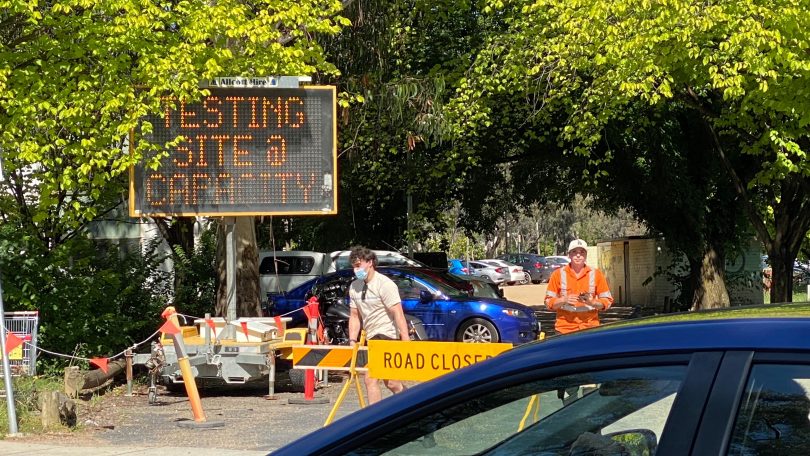
The Garran clinic hit capacity yesterday as well as this morning. Photo: Michelle Kroll.
11 am: The ACT has broken its daily caseload record for the second day in a row, reporting 85 new cases of COVID-19 overnight.
The high case numbers come as cracks are beginning to show in the ACT’s COVID-19 response system. Testing clinics are experiencing extreme demand for the fourth day in a row and parents are waiting for two days for a call back to book their 5 to 11-year-olds in for a vaccine next year.
At 10:15 am this morning, the ACT Government released wait times at its testing clinics:
- Mitchell drive through testing clinic (open 8 am to 10 pm): at capacity
- Garran testing clinic (open 7.30 m to 9 pm): 2 hours 30 minutes+
- Kambah drive through testing clinic (open 8 am to 6 pm): 2 hours 30 minutes+
- Nicholls testing clinic (open 8am to 6pm): 2 hours 30 minutes+.
The Kambah and Nicholls testing clinics have extended their opening hours tonight (23 December) from 4 pm to 6 pm.
Authorities said nothing can be done to increase testing capacity.
Yesterday, the State Emergency Service (SES) was called in to hand out water and food to people waiting to be tested.
Police have urged motorists to be careful as traffic around testing clinics is impacted. Region Media understands police are on-site at Mitchell to redirect traffic that is backed up to the GDE.
Queues of ACT-plated vehicles were also spotted at the Queanbeyan drive-through testing centre this morning.
Despite the long queues for tests, however, wait times for results are still around 24 to 48 hours, a spokesperson for ACT Health confirmed this morning.
This is still an increase on a couple of weeks ago when people were generally receiving their test results within 12 hours.
The longer turnaround is causing additional stress for people who require a negative PCR test to enter Queensland, for example. The state has mandated that a negative test result be returned within 72 hours of travel.
The addition of more gyms, hospitality venues such as nightclubs and bars, cinemas and transport routes to the ACT Government’s COVID-19 website will only serve to increase the demand for testing.
Sixteen new exposure sites were publicly listed overnight.
Stocks of rapid antigen tests in pharmacies are fast declining as Canberrans begin to stress about keeping this Christmas COVID-safe.
The ACT’s active caseload is now 245. Of these, three are in hospital. No one is in ICU or being ventilated due to COVID-19.
Of the Territory’s 12-plus population, 98.4 per cent are fully vaccinated.
A total of 5215 negative test results were recorded in the 24 hours to 9 am this morning.
Minister for Health Rachel Stephen-Smith has once again been forced to plead for calm and patience from Canberrans.
At the same time, however, she’s expressed her frustration with the requirement for PCR testing to travel interstate.
Ms Stephen-Smith acknowledged that if high case numbers continue, the current test, trace, isolate and quarantine (TTIQ) system will have to be altered.
Health authorities are worried about the system’s capacity to cope over the Christmas break with multiple factors such as low staffing numbers due to holidays, increased demand for tests for travel, and increasing case numbers meaning more healthcare staff have to be furloughed.
Earlier this week, Ms Stephen-Smith said there is not an infinite supply of healthcare workers.
It’s not just the testing centres under pressure, either.
People have reported waiting two days for a call-back to book their child in for a vaccine appointment after the line experienced “very high volumes of calls” – 13,403 calls in two days.
Case numbers around the country are also soaring.
NSW has recorded 5715 COVID-19 cases and one death in the 24 hours to 8 pm last night.
Hospitalisations are also increasing. There are now 347 people in hospital with COVID, up from 302 in the previous reporting period. There are 45 patients in ICU.
NSW Health said 94.9 per cent of the state’s 16-plus population has had one dose of a COVID-19 vaccine, while 93.5 per cent of people in the same age group have had two doses of a vaccine.
NSW Premier Dominic Perrottet announced yesterday QR check-ins would be reintroduced in hospitality and retail settings.
As in the ACT, extremely long testing queues for PCR tests have been reported, particularly in Sydney.
Rapid antigen tests are also hard to purchase at pharmacies and supermarkets across the state.
In Victoria, case numbers have also increased to 2005, with 10 deaths reported overnight.
There are 398 people in hospitals across the state and 72 people in ICU.
In Victoria, 92 per cent of the state’s 12-plus population is fully vaccinated.












